Top 12 Online Course Marketplaces (To Sell Your Courses)
 Platform Review
Platform Review

Learn what are the top marketplaces that you have available to publish and sell your online courses. Tap into the huge audiences available on these platforms, and kick start your online course business.
If you are a course creator, this question is always on top of your mind:
"where can I find more students for my courses"?
I get that, I'm a course creator too and I'm always looking for new ways to expand my current audience.
Self-hosting your courses on your own website is a great way to sell courses in general, but you know what also works very well?
Publishing your existing courses in a huge specialized online course marketplace, with tens of millions of students! 😉 Or even better, in multiple marketplaces.
But the problem is, there are literally tens of marketplaces out there on the internet. Some are the right ones for you for a number of reasons, while others are simply not worth your time.
So, what are the top online course marketplaces available right now?
These are the best online course marketplaces available to course creators:
- Udemy
- SkillShare
- PluralSight
- LinkedIn Learning
- Udacity
- Domestika
- AppSumo
- Cyber U
- Alison
- BitDegree
- SkillSuccess
- Fiverr
But the question now is, which marketplaces are the right ones for you and your courses, and why?
That's exactly what I will be covering in this post. For each marketplace we are going to:
- review the marketplace
- tell you which courses work in which marketplaces
- talk about the revenue potential of each marketplace
- give you some key stats about the established user base
- talk about the barrier to entry, meaning how hard is it to start teaching in the marketplace
- explain the marketplace revenue model
Also, you don't want to miss the final recommendations that I make at the end of the post.
So without further ado, let's get started reviewing all these marketplaces one by one, and help you find the right ones for you.
You can also check out all the free guides here at the Course Creator Academy by clicking on the Academy link on the top menu bar.
Udemy
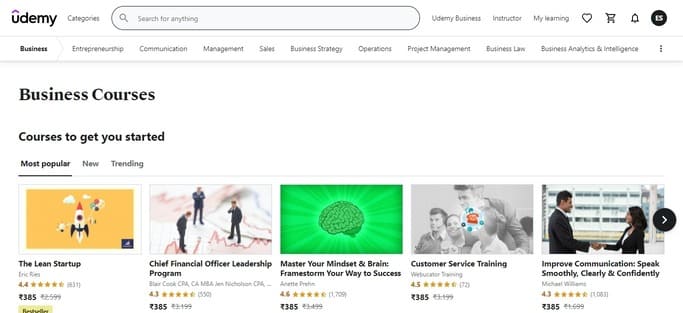
Udemy is the most popular online course marketplace that you can find on the internet right now.
With amazing numbers like 49+ million monthly students and 100+ categories to publish courses on - it becomes the most promising platform to build an online course business on.
Age of platform: founded in 2010
Course type preference: both B2B (businesses) and B2C (private consumers)
Student base: 49+ million
Revenue potential: High earning potential with top Udemy instructors making more than 1 million per year. But in the beginning, it will take some time to start earning a decent income.If you are interested to know how I made some of my revenue on Udemy, check out this post - How to be Successful on Udemy.
Barrier to entry: Udemy welcomes anyone to teach who has something worth sharing. But the platform is highly competitive so to build a successful business you will have to create high-quality courses that really stand out.
Marketplace revenue model: Individual course sales (ranging from $10 to $20), subscription plans ($29 per month), and Udemy for Business (subscription plans for teams, $360 per year per user)
My Verdict on Udemy
Udemy is a wonderful option for new course creators. I’ve personally used it to build my student base and therefore I recommend it to you too. Udemy is perfect for new course creators because of the following reasons:
- Categories: Udemy has various popular categories with millions of students signing up for courses. So, you can create courses on your niche and expect to grow on the platform.
- Udemy Marketplace Insights: Udemy provides many tools that you can use to collect valuable insights. These insights will help you optimize your courses for better performance.
- Udemy Teaching Resources: Udemy has a dedicated teaching center to help new course creators with all the resources to get started with the platform.
So, Udemy is a good option for you if you want to get access to a large built-in audience. It’s a competitive marketplace, but it also has many opportunities. So, I think it’s worth a try.
Here are some of my Udemy success tips and strategies if you want to dive into the platform.
Skillshare
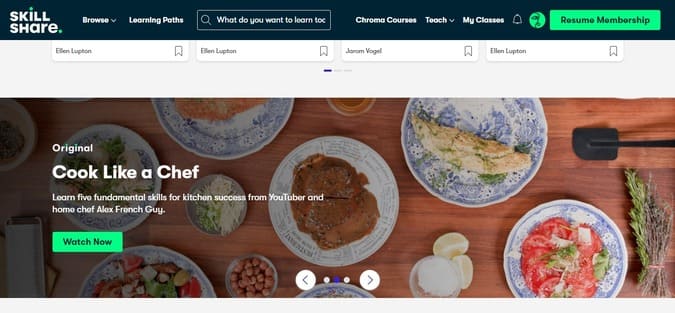
Skillshare is the largest online course marketplace for creatives and artists. It primarily sells courses on topics related to creativity like writing, art, design, illustration, etc.
It is a niche-based community - so it becomes a good choice for course creators in those categories.
Age of platform: founded in November 2010
Course type preference: B2C courses for creatives and artists. Also, business and lifestyle niches are gaining popularity.
Student base: 12 million+ monthly registered students
Revenue potential: high earning potential with top Skillshare instructors earning over $100 000 per year. And other instructors average $2k per month.
Barrier to entry: Skillshare invites anyone with creative knowledge to teach on the platform. But, they do review each class before publishing it on the platform so you’ll have to create high-quality content that actually helps students gain creative skills.
Marketplace revenue model: Subscription-based model with individual membership plans ($13.99 per month), Chroma courses ($499 for immersive multi-week classes), and Skillshare for teams (starting from $159 per user per year).
My Verdict on Skillshare
Skillshare is a great opportunity for you to start selling your courses as well as building your personal brand. Skillshare has a highly engaged audience.
Another good thing is that you don't have to create hours-long courses, all you need is to launch 20 to 30 minutes classes. It’s a plus for you if you want to test the waters first. You can publish a few classes to see if Skillshare works well for your topic or not.
Skillshare has all resources and support for you to learn and grow on the platform. Check out this post if you want to know if Skillshare is right for you.
PluralSight

Are you a programmer, and you are looking for a platform to publish programming language courses? Then you must check out PluralSight.
PluralSight is an online training platform that helps to provide continuous training to software developers.
Age of platform: founded in 2004
Course type preference: B2B
Student base: 1+ million students and 9500 companies
Revenue potential: based on the viewership of the courses you create.
Barrier to entry: You need to apply to become an author at PluralSight. An instructor support team will help you sort out everything. They prefer established course creators, or well-known authors, so it's a lot harder to become an instructor on PluralSight than at other marketplaces like Udemy.
Marketplace revenue model: Membership plans for individuals ($12.99 per month) and teams (starting from $33.45 per user per month)
My Verdict on PluralSight
If you manage to get through the approval process, PluralSight is a very good place to publish your courses.
You can create courses, assessments, and labs - so there will be more than one option to earn from.
Other than that, PluralSight has a powerful teacher community where experienced authors help new authors with the process. So, as a programming language teacher, I think PluralSight is a great place to try out.
PluralSight is invitation-only so the barrier to entry is high, and the courses you publish there will be exclusive to the platform.
So I think it will be hard to make a full-time living only with the royalties of the platform.
Instead, this is more of an excellent professional opportunity to present yourself to a large number of companies, and potentially get hired as a consultant by them.
LinkedIn Learning
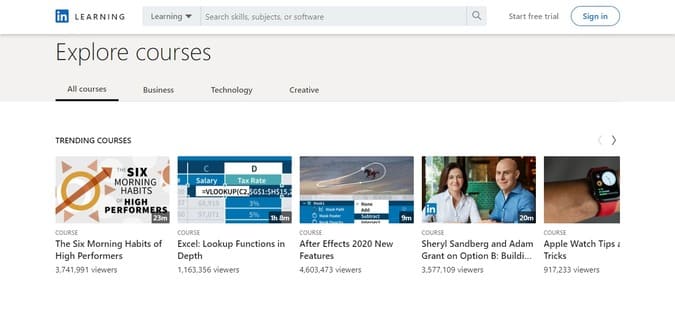
If you’re a serious business course creator, then you can’t find a better audience than on LinkedIn, where you can find almost all the professionals in your niche.
To help their users get the training and qualifications that they need, LinkedIn launched a dedicated online course platform.
It was formerly known as Lynda.com but after their purchase by LinkedIn and re-branding, it is now named LinkedIn Learning instead.
Age of platform: founded in 2017 (when Lynda.com was acquired)
Course type preference: B2B with categories business, creative, and technology
Student base: 90+ million monthly users
Revenue potential: high with instructors earning $100,000 as royalty income. But as you’re teaching professionals so you’ll need to put in the extra effort to create extremely valuable content.
Barrier to entry: Difficult, LinkedIn occasionally invites experts but you can also fill out an instructor application form. If you’re qualified, they will reach out to you.
Marketplace revenue model: Subscription-based model with individual membership plans ($13.99 per month) and team plan (discloses pricing on request and team’s size).
My Verdict on LinkedIn Learning
LinkedIn Learning is one of the best platforms when it comes to audience size and engagement.
But similarly to PluralSight, the platform has a high barrier to entry and it requires exclusivity.
LinkedIn Learning is certainly one of the major players in the online learning market, but it's not ideal for small course creators, especially if they are just getting started.
Udacity
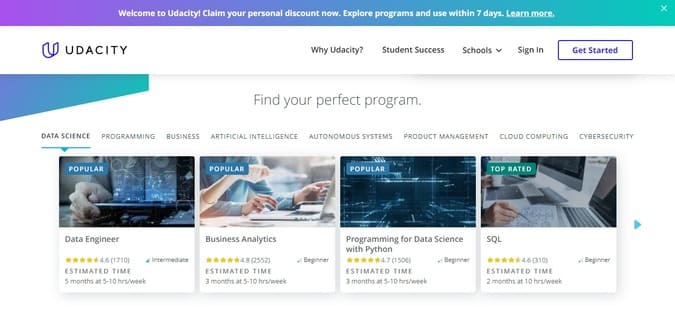
Are you a tech expert and create technology-related courses mainly? Then, you will find your target audience on Udacity. But many other niches like business, programming, AI, etc are also popular there.
And Udacity is the fourth most popular MOOC so it’s definitely a great platform for course creators.
Age of platform: founded in June 2011
Course type preference: B2B & B2C
Student base: 1.6 million per month (120 million registered students so far)
Revenue potential: High with instructors earning $5000 to $10,000 per year on average
Barrier to entry: You can apply to become an instructor or a mentor at Udacity. Their hiring process is a bit hard as they look for qualified professionals who possess the necessary skills and expertise, so it's not for everyone.
Marketplace revenue model: individual course sales model ($399), membership plans ($1000), plans for businesses, as well as customized plans for government.
My Verdict on Udacity
Udacity is a highly reputed platform with an impressive student size (120 million) and if you’re an instructor at Udacity then it definitely adds a lot to your credibility.
You will be recognized as an industry expert that teaches the professionals of large Fortune 500 professionals.
But a bit like PluralSight and LinkedIn learning, the invitation-only model makes it difficult to become an instructor there, especially if you are just getting started.
Domestika

Domestika is another popular community for creative people. And it’s also an online course marketplace for categories like design, writing, illustration, etc.
If you’re a course creator in one of these niches then Domestika is a potential platform to launch your courses.
Age of platform: founded in 2010
Course type preference: B2B & B2C
Student base: 10 million per year
Revenue potential: high as your income will depend on the number of your courses sold.
Barrier to entry: You can apply to become a Domestika teacher here. You will have to send a convincing proposal with unique online course ideas. After reading your proposal they will reach out to you.
Marketplace revenue model: individual courses ($10 to $40), course bundles ($10 to $40), Plus membership ($50 per year)
My Verdict on Domestika
I think Domestika is a nice platform for new course creators as it is also new. Originally, its headquarters was in Spain so most of the courses were in the Spanish language.
But now, they are converting courses into English courses, so if you’re able to create helpful content in the English language then you already stand out.
Plus, you can sell the same courses on Skillshare to add an extra stream of income, ad they don't require exclusivity.
AppSumo
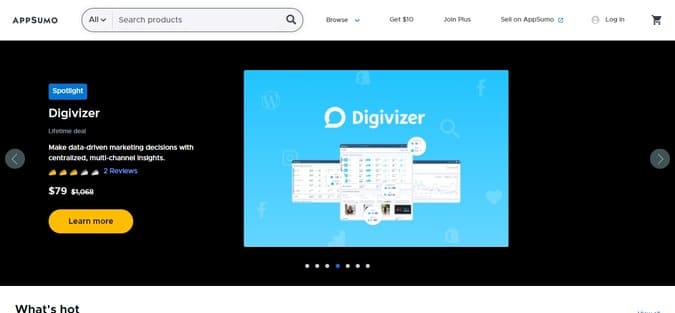
Appsumo is a marketplace for entrepreneurs where you can find amazing deals on digital products like ebooks, software products, pdfs, online courses, plugins, templates, Chrome extensions, etc.
Besides being a great place to sell software, AppSumo is also the ideal platform to sell online courses on niches like business, entrepreneurship, technology, etc.
Age of platform: founded in March 2010
Course type preference: B2B & B2C
Student base: 1 million visits per month
Revenue potential: High as you get full freedom to add your price listing. AppSumo runs sales regularly and will market your product to its large audience.
Barrier to entry: Easy, you can easily list your online course as a digital product (add as many listings as you want) and they will approve it if everything looks good.
Marketplace revenue model: Individual product sales (pricing can be different) & membership ($99/year)
My Verdict on AppSumo
AppSumo is an amazing place for course creators. Firstly, because it’s a niche-specific platform (you’ll only find real business owners or entrepreneurs).
And secondly, because these students will be serious learners - they want to gain skills to improve an aspect of their business.
The AppSumo dashboard is very beginner-friendly. On your dashboard, you will get access to analytics and tools to optimize your listing to get it ranking higher on the marketplace.
Notice that AppSumo will only promote more your courses after getting to 5 reviews, so it helps a lot if you already have an established audience that you can send there.
CyberU
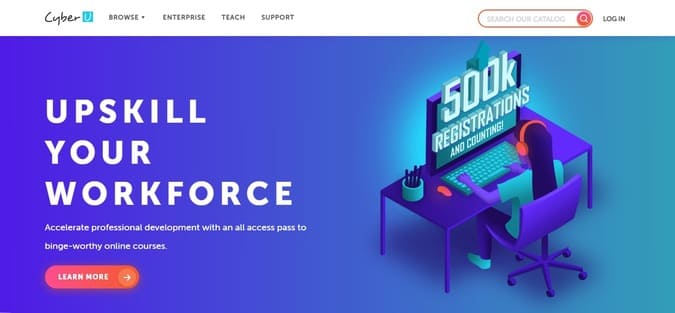
CyberU is a new online course marketplace that creates courses in all niches but kept its focus on niches like business, workplace, leadership, office productivity, etc that help businesses up-skill their workforce.
So, it’s another good place to sell business-related courses.
Age of platform: founded in 2016
Course type preference: B2B & B2C
Student base: 500k student registrations so far
Revenue potential: average as the marketplace is still new
Barrier to entry: You can apply as an instructor here. It’s also easy to get accepted on the platform as long as your course idea is unique.
Marketplace revenue model: individual course sales ($10 to $40)
My Verdict on CyberU
Getting started on CyberU will be easy as the platform is still new and there isn’t a lot of competition (yet).
You will be teaching enterprise-level employees so it’s a great opportunity to build a personal brand.
But right now, there just isn’t much public information about how instructors are paid or what percentage is cut from each course.
Alison
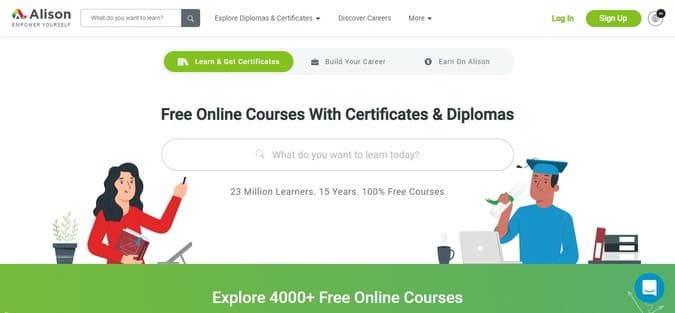
Alison is an online course marketplace that offers the possibility to obtain certificates and diplomas. The marketplace also works as a career guide.
Most of the courses are offered free to students as the primary income model is based on advertising.
Age of the platform: founded in 2007
Course type preference: B2B & B2C
Student base: 23 million
Revenue potential: up to 50€ per day.
Barrier to entry: difficult as they get many applications. But they accept and train people to become a qualified Alison publisher.
Marketplace revenue model: Ads, premium membership (7.99€ per month), and Alison for business (disclose pricing on request).
My Verdict on Alison
Alison is a great marketplace, but it has a high barrier to entry.
Also, you don't have ownership of the courses you publish there, and you cannot sell the same courses in other platforms. But the student base is massive so you can expect to build a nice audience there.
BitDegree

If you’re a crypto course creator (or want to become one) then the best place to begin your online course creator journey is BitDegree.
Because there you will find a lot of students interested in cryptocurrency.
BitDegree has helped 1+ million students with career paths show it is a serious platform and you’ll become a part of something amazing.
Age of platform: founded in 2017
Course type preference: B2B & B2C
Student base: 279,000+ student enrollments
Revenue potential: Earning depends on the course price and the viewership of your content. Check out this guide by BitDegree to learn more.
Barrier to entry: You can apply to become a teacher at BitDegree here.
Marketplace revenue model: individual course pricing model
My Verdict on BitDegree
If you’re in the crypto industry then you can’t find a better place filled with so many engaged students. Not only it is a great platform to build a personal brand but it’s also a wonderful opportunity to learn.
How? BitDegree has a teacher’s academy to guide new course creators. And their 24*7 support team will help you with all your queries.
You get a nice dashboard and course creation window (you’ll be creating a gamified learning experience for your students) to create courses. And a sales and insights window to track analytics.
SkillSuccess

SkillSuccess is a marketplace for anyone to learn skills and advance in their career to make money online. You can launch courses on topics like business, technology, personal development, marketing, design, lifestyle, non-profit, etc.
SkillSuccess is driven by a powerful mission - to help people acquire skills to attain their dream career.
Age of platform: founded in 2012
Course type preference: B2B & B2C
Student base: 50,000 registered students
Revenue potential: Depends on the instructor’s course sales, marketing efforts, and many other factors.
Barrier to entry: You can apply to become an instructor at Skillsuccess here.
Marketplace revenue model: individual course sales and membership plans
My Verdict on SkillSuccess
SkillSuccess is a nice option for course creators but because it is generalized you shouldn’t rely on it alone. Compared to other platforms its audience size is relatively small.
But they don't ask for exclusivity, and they have a huge built-in audience. So don't overlook this platform, it's well worth it to try to publish your courses there and generate some extra income.
Fiverr Learn

Fiverr is a popular online marketplace to find service sellers. But it's also a good platform to sell online courses. One reason to consider Fiverr is its large audience base - 4.1 million monthly users.
Online courses on business-related topics will work well because these visitors are entrepreneurs or service providers who always want to improve their skills.
Age of platform: founded in 2010
Course type preference: B2B & B2C
Student base: 4.1 million monthly visitors
Revenue potential: depends as your income will be based on how many courses you can sell.
Barrier to entry: You can become a seller on Fiverr and sell courses.
Marketplace revenue model: Individual course sales model (starting from $19)
My Verdict on Fiverr
Fiverr Learn is a good platform for course creators as it gives all the basic tools to create and publish courses. You can set gigs to sell courses. Or you can also offer tutoring one-on-one services.
It’s a reliable option for selling courses in niches like business, marketing, website development, etc. But, if you’re creating courses on these niches, Fiverr shouldn’t be your first choice.
In that case, it can be used as an add-on to make some extra income, as other platforms like Udemy or Udacity have a much larger audience for these niches.
Also, Fiverr cuts a 20% commission on each course you sell but that’s what other marketplaces do too. So, if you want to then here’s a step-by-step guide on how to sell courses on Fiverr.
Conclusion and Next Steps
As you can see, many marketplaces have a high barrier to entry, and they require exclusivity to teach there. This makes the largest marketplaces like Udemy or SkillShare that much more attractive.
Not only do they don't require exclusivity, but also anyone can publish there. So I recommend that you prioritize those two marketplaces above all others.
But depending on your niche, there are other marketplaces where it's very much worth it to also try to publish your courses.
For example Domestika and SkillSuccess are great examples of invitation-only marketplaces that don't require exclusivity, and that also have large audiences.
So if your courses are already doing well on Udemy or Skillshare, chances are that you can also publish them in those other marketplaces, and make some extra revenue that way without having to create new courses.
But remember that although marketplaces are great, you don't own the audience there or have access to your student's emails.
Also, you might have to sell your courses at a very low value, and the marketplaces take high commissions, which can be as high as 75%.
That is why I recommend to all course creators to adopt a mixed publication model. The idea is that you should publish to as many marketplaces as possible, as well as on your own website.
On your website you can set your own prices, get your student's emails, and sell higher ticket products like subscriptions, course bundles, enterprise plans, and coaching packages.
You can build your own audience and your own unique brand. So all you need is an affordable and easy to use course hosting platform, that allows hosting your courses in your own custom domain, under your own brand.
That is why I created OnlineCourseHost.com, to help out course creators like you, by creating the easiest to use online course platform on the market, that comes with built-in email marketing (send bulk newsletters to your students).
But more than a platform, we wanted to give you also all the information that you need to grow your online course business successfully.
That’s why we created the Course Creator Academy where you can find everything you need to become a successful online course creator all in one place for free.
To get notified when new content is available here at the Academy, you can subscribe here to our weekly newsletter:
If you are looking to ask any questions on online course creation, you can reach me here on my Facebook group:
Join the Course Creator Academy Facebook Group
Ready to learn how to launch your first course on OnlineCourseHost.com? Here are the helpful guides for you to check out:
- How To Create an Online Course To Sell (Top 9 Ways)
- Proven ways to market your online course
- Best Online Course Platforms (Ultimate Guide)
- How To Create An Online Course (In 15 Super-Practical Steps)
- How To Choose An Online Course Topic That Sells
- How To Record And Edit Your First Online Course
- Affordable Online Course Equipment - Complete Practical Guide
- Best online course platforms to sell courses
- The Ultimate Online Course Launch Checklist
- Where should you publish your online course: Self-hosted website or marketplace
- Create A Powerful Brand For Your Online Courses (In 5 Steps)
- How To Sell Online Courses? The Ultimate Guide
- How To Promote Your Online Course - Complete Guide
I hope you found this post helpful, let me know in the comments below what other topics you would like me to cover, or any questions that you have?
Thanks for reading… and enjoy the course creation process! 😉
Vasco Cavalheiro
OnlineCourseHost.com Founder & Online Course Creator








 Start Here
Start Here Course Creation Journey Step by Step
Course Creation Journey Step by Step  Course Creation Software Reviews
Course Creation Software Reviews Online Course Marketing
Online Course Marketing Course Creation Tips & Tricks
Course Creation Tips & Tricks Course Equipment
Course Equipment Online Course Marketplaces
Online Course Marketplaces Revenue Reports
Revenue Reports Best Practices
Best Practices Frequently Asked Questions
Frequently Asked Questions Platform Reviews
Platform Reviews